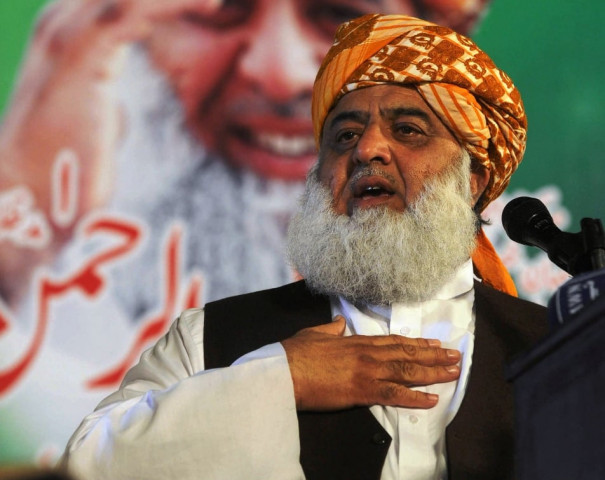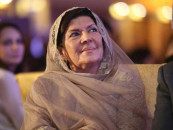Religious parties warn of 1977-like agitation
Parties to protest if the controversial women’s protection act of Punjab is not withdrawn by March 27

JUI-F chief Maulana Fazlur Rehman. PHOTO: AFP
Religious parties warned the government on Tuesday of a nationwide protest movement if the controversial women’s protection act of Punjab was not withdrawn by March 27.
Describing the Protection of Women Against Violence Act as ‘un-Islamic’, the religious groups convened another meeting on April 2 in Islamabad to decide their future course of action. Representatives of more than 35 religious parties huddled in Mansoora, Lahore, for an All-Pakistan Ulema Conference organised by the Jamaat-e-Islami and unanimously condemned the women’s protection law.
Religious groups say law protecting women from abuse 'un-Islamic'
They called upon the government to re-introduce the law, accommodating the recommendations of the Council of Islamic Ideology, which advises parliament on the compatibility of laws with Islam. It has already declared the act un-Islamic. The government has formed a consultation committee to mull over possible amendments.
The Protection of Women against Violence Act passed last month gives legal protection to women from domestic, psychological and sexual violence. It recommends creating a toll-free abuse reporting hotline, shelters for women and district-level panels to investigate reports of abuse. It also allows using GPS bracelets to keep track of offenders.
Unanimous condemnation
A joint declaration after Tuesday’s conference said statements given by government officials on the women’s protection law and Mumtaz Qadri’s hanging were against the Sharia, the ideology of Pakistan and its Constitution.
Pakistan was founded on the principles of Islam and the Objectives Resolution, it said, adding that all religious parties would thwart all efforts to make Pakistan a liberal or secular state. The resolution claimed the law would increase the divorce rate in society and result in damaging the traditional family structure. It also said that the law was introduced in an effort to Westernise the country.
Women protection bill challenged in sharia court
The leaders called for the proper implementation of the existing laws on violence against women instead of introducing un-Islamic laws.
Condemning the execution of Mumtaz Qadri, the declaration said all cases registered under blasphemy laws should be expedited and the convicts punished accordingly.
The government was also warned against linking terrorism with Islamic seminaries and asked to remove all restrictions against mosques and religious schools under the National Action Plan. JI chief Sirajul Haq had earlier said the religious parties were against violence targeting women, but the law would destroy the family system of Pakistan.
Fazlur Rehman claimed Premier Nawaz Sharif was himself upset with the passage of the bill as it was done without his prior approval. “I was surprised the premier did not know about it, but I am happy that he wants to resolve the issue now,” he said.
Divided within
Interestingly, legislators in the Punjab Assembly are also divided on the controversial law. PPP parliamentary leader Qazi Ahmad Saeed claims there were reservations among legislators even when the bill was passed. “But voicing them meant creating the impression that we were against women,” he said.
None of the male legislators from the opposition benches were present or opposed the bill during the vote, something which Saeed admits. “At first, the government was in haste. Now, they just want to silence the religious parties before it balloons into a bigger issue.”
Any amendments now will see the PPP engaging more actively. “Our party’s stance is clear. We will oppose anything deemed un-Islamic,” Qazi said.
Of the 76 women lawmakers of the Punjab Assembly, only 44 were present at the time of legislation. PTI’s Shunila Ruth was one of them. “I fail to understand the hue and cry. There is a perception that this law has somehow challenged the masculinity of men in our society,” she said.
Fazl says PM has promised to tweak women’s law
She said the positive part of the law was at least there was a state organ to address these concerns. “The only opposition towards this law would be if anyone comes out saying there is no violence against women to begin with. Can anyone substantiate that claim?” Shunila, however, says there is no harm in addressing the reservations through amendments.
Punjab Assembly’s Standing Committee on Gender Mainstreaming Chairperson Raheela Khadim believes not just the law but the women supporting it also were facing criticism. “Women are usually snubbed in the society and this attitude is present even in the upper echelons of the society. An example would be the criticism being faced publicly by women supporting the law.”
One of the many women behind the law, Azma Bukhari says despite the growing opposition, the law is in no danger. “There are so many contradictions in the concerns raised. There is no answer over which clause of the law is un-Islamic,” said the PML-N lawmaker, also the chairperson of the standing committee on Law and parliamentary affairs.
Published in The Express Tribune, March 16th, 2016.



















COMMENTS
Comments are moderated and generally will be posted if they are on-topic and not abusive.
For more information, please see our Comments FAQ